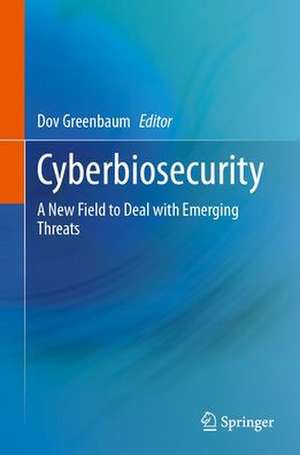Cyberbiosecurity: A New Field to Deal with Emerging Threats
Editat de Dov Greenbaumen Limba Engleză Hardback – 11 mai 2023
| Toate formatele și edițiile | Preț | Express |
|---|---|---|
| Paperback (1) | 990.66 lei 38-44 zile | |
| Springer International Publishing – 11 mai 2024 | 990.66 lei 38-44 zile | |
| Hardback (1) | 1165.03 lei 6-8 săpt. | |
| Springer International Publishing – 11 mai 2023 | 1165.03 lei 6-8 săpt. |
Preț: 1165.03 lei
Preț vechi: 1456.29 lei
-20% Nou
Puncte Express: 1748
Preț estimativ în valută:
222.92€ • 232.77$ • 184.08£
222.92€ • 232.77$ • 184.08£
Carte tipărită la comandă
Livrare economică 15-29 aprilie
Preluare comenzi: 021 569.72.76
Specificații
ISBN-13: 9783031260339
ISBN-10: 3031260333
Ilustrații: VIII, 300 p. 30 illus., 26 illus. in color.
Dimensiuni: 155 x 235 mm
Greutate: 0.62 kg
Ediția:2023
Editura: Springer International Publishing
Colecția Springer
Locul publicării:Cham, Switzerland
ISBN-10: 3031260333
Ilustrații: VIII, 300 p. 30 illus., 26 illus. in color.
Dimensiuni: 155 x 235 mm
Greutate: 0.62 kg
Ediția:2023
Editura: Springer International Publishing
Colecția Springer
Locul publicării:Cham, Switzerland
Cuprins
Introduction: Origin and Intent for the New Field of Cyberbiosecurity.- Cyber and information security in the bioeconomy.- Palmer Mission-Aware Differences in Cyberbiosecurity and Biocybersecurity Policies: Prevention, Detection, and Elimination.- Revisiting the Digital Biosecurity Landscape.- Security Vulnerabilities and Countermeasures for the Biomedical Data Life Cycle.- Cybersecurity Across the DNA-Digital Boundary: DNA Samples to Genomic Data.- Applying CVSS to Vulnerability Scoring in Cyber-Biological Systems.- Biocrime, the Internet-of-Ingestible-Things and Cyber-biosecurity.- Potentials of pathogen research through the lens of cyberbiosecurity, or what threat actors can learn from the Covid-19 pandemic.- How to Protect Biotechnology and Biosecurity from Adversarial AI Attacks? A Global Governance Perspective.- Safeguarding the Guardians to Safeguard the Bio-Economy and Mitigate Social Injustices.- AI for Cyberbiosecurity inWater Systems - A Survey.- Artificial intelligence and the weaponization of genetic data.- The Attack Surface of Wet-lab Automation.
Notă biografică
Dov Greenbaum is Director of the Zvi Meitar Institute for Legal Implications of Emerging Technologies and a professor of law at the Harry Radzyner Law School, Reichman University, Herzliya, Israel (IDC). Dov is also an affiliate researcher in the Department of Molecular Biophysics and Biochemistry at Yale University.
Dov is a certified Information Privacy Professional, Europe (CIPP/E), the editor of Frontiers in ELSI in Science and Genetics.
He is also an intellectual property attorney, licensed to practice in California and before the United States Patent and Trademark Office.
Dov is a certified Information Privacy Professional, Europe (CIPP/E), the editor of Frontiers in ELSI in Science and Genetics.
He is also an intellectual property attorney, licensed to practice in California and before the United States Patent and Trademark Office.
Textul de pe ultima copertă
Biocybersecurity applies cybersecurity research to the field of biology, and, to a lesser degree, applies biological principles to the field of cybersecurity. As biologists increasingly research, collaborate, and conduct research online, biocybersecurity has become crucial to protect against cyber threats. This book provides an overview of biocybersecurity through the lens of researchers in academia, industry professionals, and government, in both biology and cybersecurity fields. The book highlights emerging technologies, and identifies emerging threats connected with these technologies, while also providing a discussion of the legal implications involved.
This book takes on a multidisciplinary approach, and appeals to both professionals and researchers in the synthetic biology, bioinformatics, and cybersecurity fields.
Caracteristici
Includes case studies of cyber attacks on biosensors and DNA signatures in GMO foods Contains persepectives from government, synthetic biology, and computer science Discusses how cyber threats can be tackled through incorporating methodoliges learned from biology
